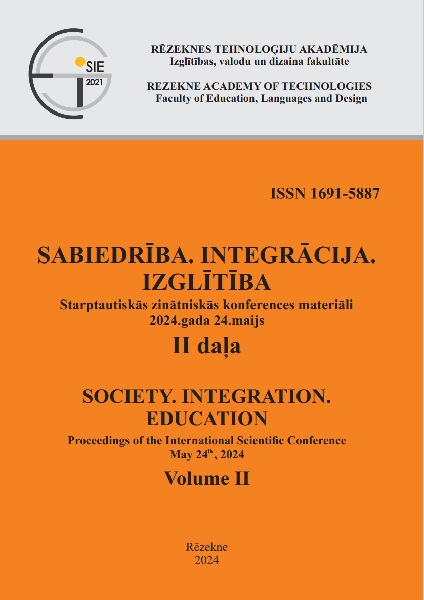TRENDS OF IMPLEMENTATION OF RESEARCH-EXPERIMENTAL ACTIVITIES IN PRESCHOOL EDUCATIONAL INSTITUTIONS OF UKRAINE IN TODAY’S CONDITIONS
DOI:
https://doi.org/10.17770/sie2024vol2.7890Keywords:
research-experimental activity, children’s experimentation, educational process of preschool educational institution, preschool children, educatorsAbstract
The article characterizes the current state of implementation of children’s experimentation in preschool pedagogy of Ukraine. The results of a survey of pedagogues of preschool educational institutions regarding the peculiarities of the organization and implementation of the functions of research-experimental activities of preschoolers have been given.
The authors carried out definitive analysis of the concepts of the research «children's experimentation», «research-experimental activity». The content and features of the organization of research-experimental activities of preschool children have been clarified, taking into account the psychological-pedagogical publications of modern foreign and Ukrainian scientists and the available creative pedagogical experience. Examples of researches and experiments for preschool children have been offered.
Materials and methods. Theoretical (analysis and synthesis of scientific sources, generalization and systematization) and empirical methods (survey) have been used in the process of research. The authors conducted a questionnaire in order to find out the state of the organization of children’s experimentation in preschool educational institutions.
Results. As a result of the research, it is established that almost the third of the respondents are afraid to change the traditional system of preschool education, namely the transfer of «ready-made» knowledge to children, which becomes the main obstacle to the introduction of experimentation into educational practice.
Conclusions. Based on the analysis of pedagogues’ surveys, the study of theoretical and practical experience, trends of implementation of children’s experimentation in preschool educational institutions in today’s conditions have been determined.
References
Bass, I., Bonawitz, E., Hawthorne-Madell, D., Vong, W. K., Goodman, N. D., Gweon, H. (2022). The effects of information utility and teachers’ knowledge on evaluations of under-informative pedagogy across development. Cognition, Vol. 222, 104999. DOI: https://doi.org/10.1016/j.cognition.2021.104999.
Boichuk, V. M., & Boichuk, O. Yu. (2020). Multydystsyplinarnyi pidkhid do vykladannia humanitarnykh dystsyplin u zakladakh osvity. Young, 79 (3.1). Bonawitz, E. B., Tessa van Schijndel, J.P., Friel, D., Schulz, L. Children balance theories and evidence in exploration, explanation, and learning. Cognitive Psychology, 64 (4). DOI: https://doi.org/10.1016/j.cogpsych.2011.12.002.
Cook, C., Goodman, N. D., Schulz, L. E. (2011). Where science starts: Spontaneous experiments in preschoolers’ exploratory play. Cognition, 2011, 120 (3), 341-349. DOI: https://doi.org/10.1016/j.cognition.2011.03.003.
Dzhanda, H. B. (2019). Potentsial prakseolohichnoho pidkhodu v profesiinii pidhotovtsi maibutnikh uchyteliv pochatkovykh klasiv. Teoriia i metodyka profesiinoi osvity.
Fridberg, M., Jonsson, A., Redfors A. & Thulin S. (2019). Teaching chemistry and physics in preschool: A matter of establishing intersubjectivity. International Journal of Science Education, 41 (17), 2542-2556. DOI: 10.1080/09500693.2019.1689585
Gitomer, D. H., & Zisk, R. C. (2015). Knowing what teachers know. Review of Research in Education, 39, 1–53. DOI: 10.3102/0091732X14557001
Karuk, I. V. (2020). Definityvnyi analiz ta sutnist poniattia «eksperymentalna diialnist». Naukovi zapysky Vinnytskoho derzhavnoho pedahohichnoho universytetu imeni Mykhaila Kotsiubynskoho. Seriia: pedahohika i psykholohiia, 61, 30-35.
Karuk, I., Kolesnik, K, Kryvosheya, T., Prysiazhniuk, L., Shykyrynska, O. (2021). Organization of group activities of older preschool children in the process of experimenting. Society. Integration. Education Proceedings of the International Scientific Conference. Volume II, 729-743.
Karuk, I., Kolesnik, K., Kryvosheya, T., Prysiazhniuk, L., Shykyrynska, O., Vyshkivska, V., Komarivska, N. (2022). The development of cooperation skills of senior preschoolers in the experimentation process. SOCIETY. INTEGRATION. EDUCATION Proceedings of the International Scientific Conference. Volume I, 404-414. Köksal, Ö., Sodian, B., Legare, C. H. (2021). Young children’s metacognitive awareness of confounded evidence, 205. DOI: https://doi.org/10.1016/j.jecp.2020.105080.
Kruty, K., Holiuk, O., Rodiuk, N., Popovych, O., Zdanevych L., Bilska, O., Pakhalchuk, N.(2021). Verification of assessment scales of the sensory enriched enriched environment ecers-r and sstew or implementation in Ukraine. SOCIETY, INTEGRATION, EDUCATION, VOL II, 756-767. DOI: 10.17770/sie2021vol2.6317 Lapidow, E., Walker, C. M. (2020). Informative experimentation in intuitive science: Children select and learn from their own causal interventions. Cognition, 201, 104315. DOI: https://doi.org/10.1016/j.cognition.2020.104315
Myronchuk, N. M. (2018). Kontekstnyi pidkhid u pidhotovtsi studentiv do profesiinoi diialnosti u zarubizhnii pedahohichnii teorii. Kreatyvna pedahohika, Vyp. 13. Zhytomyr. S. 95-101.
Pirozhenko, T., Havrysh, N., Brezhnieva, O., Baiiev, O., Reipolska, Lysenko, H. (2021). Bazovyi komponent doshkilnoi osvity v Ukraini. K.: Vydavnytstvo. 38 s.
Skalstad, I., Munkebye, Е. (2022). How to support young children's interest development during exploratory natural science activities in outdoor environments. Teaching and Teacher Education, 114. DOI: https://doi.org/10.1016/j.tate.2022.103687 Sobel, M., Benton, D., Finiasz, Z., Taylor Y., Weisberg, D. S. (2022). The influence of children’s first action when learning causal structure from exploratory play, 63. DOI: https://doi.org/10.1016/j.cogdev.2022.101194.
Spektor-Levy, O., Baruch, Y. K., & Mevarech, Z. (2013). Science and scientific curiosity in pre-school—The teacher’s point of view. International Journal of Science Education, 35 (13), 2226–2253. DOI: 10.1080/09500693.2011.631608
Tessa van Schijndel, J.P., Visser, I., Bianca van Bers, M.C.W. , Raijmakers, M.E.J. (2015). Preschoolers perform more informative experiments after observing theory-violating evidence. Journal of Experimental Child Psychology, 131, 104-119. DOI: https://doi.org/10.1016/j.jecp.2014.11.008.
Thulin, S., & Redfors, A. (2017). Student preschool teachers’ experiences of science and its role in preschool. Early Childhood Education Journal, 45 (4), 509–520. DOI: 10.1007/s10643-016-0783-0.






